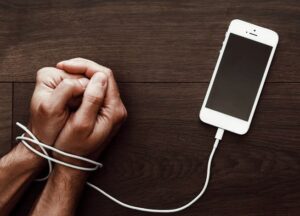Consider the possibility that I am about to reveal to you that your smartphone does not need to boom, signal, or light up like the Fourth of July at regular intervals. It’s anything but difficult to overlook, however, you can wipe out home screen warnings without your work or individual life languishing.
Take my MotoG5. It’s a bit of metal and plastic, however inside are applications I, lamentably, can’t manage without. Messages and emails are significant for staying in contact with my companions and business work, particularly in a period of a global pandemic where the use of the internet has elevated enormously. Genuine phone features are vital: I use it like all of you to update people on my stories, call my mother, and feel somewhat more secure when I’m strolling home around evening time.
With the doom scrolling-fever taking a downturn with the documentary The Social Dilemma demonstrating how notifications and social media is taking a toll on our well-being, the question being – Is turning your notification off really a leveling up or worsening of your mental health?
Research by the Florida State University in 2015 showed that among the students appearing in tests mandating complete attention, any loud interruption from their mobile phones influenced the results of the students in a negative way. This phenomenon of notifications hindering the efficiency and chemistry of our brain is known as ‘switch cost.’
“We think it interrupts our efficiency with our brains, by about 40%,” Scott Bea, a psychologist at Cleveland Clinic told CBS. “Our nose is always getting off the grindstone, then we have to reorient ourselves.”
Constantly waiting for a notification to pop up can put us to the extreme edge which heightens our cortisol level leading to the jump of our heartbeat. On the other hand, scrolling through social media and talking to our loved ones on it can boost our dopamine level.
When Deloitte surveyed 4,150 British adults in 2017 about their mobile habits, 38% said they thought they were using their smartphones too much. Among 16-to 24-year-olds, this figure rose to more than half. Habits such as checking apps in the hour before we go to sleep (79% of us do this, according to the study) or within 15 minutes of waking up (55%) may be taking their toll on our mental health. Moreover, an average person checks their phone approximately 47 times a day.

There are numerous types of researches meandering around it, we went to the people around us to give us their personal views on if turning your notifications off actually improved their mental health and overall well being.
- I’m a Professional Accountant, a CA to be more precise. My work usually involves a lot of new updates, frequent changes in the laws, or taxes. Not long ago, I was a part of an Investment Company, the Meetings, the fluctuating markets, the strategies planned were just the same to keep up with it the Notification button not only was ‘On’ but with a volume, I can hear up to a distance. At times stressed and frustrated, other times excited and motivated. Later after I left everything behind for some time, I realized I’ve changed the way I looked at things, the way I felt about walking down the street with no worry, taking deep breaths and doing just nothing, the whole day blank with no plan…, for a moment the relaxed mind. But then again I saw a kid in my neighbourhood, desperately waiting for likes on his recent post, literally refreshing the screen twice/thrice a min. I’m from a generation where enjoyment was still there without the internet. I can control myself with what I have to see and till when. Anyway, I started keeping my phone in my room, upstairs and either go walking, gym. I don’t have that urge to pick up the phone every now and then for notifications. Even if it’s about my clients, I work with appointments, at the given time I’m there present, yes updated with the laws at the right time, it doesn’t make a difference with my personal life. Conclusion: Turning off notifications can be a disaster, it also is a great buzz when you’re using it right. I know a few incidents I’ve seen on a show. Turned off Notifications cannot notify you of any sort of emergency. Turning off Notifications can also get you into huge trouble. Turning off Notifications maybe a pass to a great opportunity. Suggestions: Organise your Work/Personal life so well that you understand when’s and how much is the right time.
- Like I get a lot of notifications in a day but due to that, I have become desensitized to them. So, it doesn’t affect me anymore. So, yeah notifications don’t affect my daily life.
- I think it would obviously help me focus on my work better and not pick up my phone every 5 minutes but also, I think I would feel anxious because I constantly feel the need to check up on my loved ones, and not responding would make me feel guilty.
- To be honest, I have practiced this very often in my daily routine, because I feel social media can be sickening at certain levels. Even if you know that the images you’re viewing on social media are manipulative, they can still make you feel insecure about how you look or what’s going on in your own life. You tend to compare yourself with others, and the idea that you’re missing out on certain things can influence your self-esteem or trigger anxiety. So a social media break works as detox therapy for me.
- It always helped me always. I am happier when I don’t have any notification. Or my phone is in flight mode.
- Since the phone has become very much part of my daily life, I think turning off all the notifications in there will make me go crazy. Instead of bringing mental peace, it would rather add more anxiety to my head. I may keep checking my phone every now and then for notifications on my own. Therefore, it gives a big NO to improving my mental health.
- Turning off one’s notification can give lots of relief from unnecessary disturbances, it further allows you to focus more on your task without opening your screen every once in a while, on the other hand, you can also miss important updates as well by doing so. Yes! It will affect a lot in one’s daily routine if they turn off their notifications.
- Constant notifications do sometimes affect mental edifice and are a source of distraction. If I am really affected by some source then it might be a help but mostly it doesn’t affect my daily life.
- It’ll have a substantial positive effect on my overall lifestyle. I often find myself distracted by the endless Twitter and YouTube notifications that hamper my productivity potential. I’d be more than happy to miss out on the world.
- I believe it to be an extremely significant step towards improving one’s mental health, especially for someone with anxiety, stress, and related issues. Not to mention it reduces distractions to a great level and also, it increases productivity. So according to me it would help a lot in improving one’s mental health and could even be a life-changing step for someone with mental health issues. I personally have turned off almost all notifications on my phone for a very long time now, so I surely know it does make a huge difference.
- The best thing after turning off notification is that now I don’t have to pay attention to every notification. Get rid of those marketing ads that pop up after every 30-40 min. I can concentrate more on my work.
- So it would be something that won’t affect my daily life. Yeah, because being on social media for my work helps me spend my time and helps me learn more. If I get detached all of a sudden it will affect me. I won’t be able to spend my time and focus.
- To be honest I just use my phone to connect with people and if I’m able to talk to those people without a phone then I’ll be happy to stop using this device. And as for my mental health, I don’t think turning notifications off will really affect it. I only use my phone whenever I am free.
- Of course, it will. The less you’re distracted the more peaceful you get. It will only improve my mental health. It doesn’t affect me in my daily life now. Maybe I’m used to it so that’s why it’s sometimes easy for me to focus on something while having my phone around.
- It would improve our mental health. Notifications from communicating apps would make you expect. For example, you may be expecting a message from someone and if a notification pops up on your screen you will leave whatever you are doing to check who messaged you. Breaking your concentration is the major thing it does.
- Turning my notifications will surely help me improve my mental health. That’s what I’ve been doing on my super gloomy days and it really helps. Notifications are extremely distressing on my bad days. And what’s more, you are attracted to them too.
If you carefully read all of them, you will see turning notifications off is a sign of turning your pessimism off. Some people see it as a detox therapy and some as their happy days. The heightened use of social media has led to the lowering of self-esteem. Shutting yourself off from the social world can lead you to ponder and upset about the fact that you are missing out on things and on the contrary scrolling through it could lead you to be depressed about how boring your life is.
At first, detaching from your popping messages can be hard. And at this time of Pandemic when all of us are immersed in the world of social media with no chorus at our shoulders, turning off social media is a nightmare.
The advancements in depression and anxiety with the growing use of social media and the fixture of this generation to that pop sound sometimes lead us to question our sanity. Look at our impatience, that pop sound can make us anxious and how hard it is to not touch our phone when we hear that sound.
“Only two organisations call their customer’s ‘users’- illegal drugs and software”- The Social Dilemma.

It is high time we acknowledge our addiction to social media and its negative effects. What once began as a way to ‘communicate with one another moulding our social media according to our life’ has changed to ‘us moulding our life according to social media.’
Read:
The Social Dilemma: Doomscrolling & How We Are Being Sold On Social Media.
Don’t Miss Diagnosis: Take Note Of Your Mental Health & Seek Professional Help











